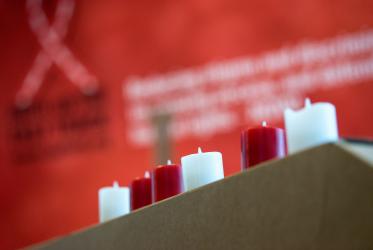By Gregg Brekke*
A series of four manuals produced by the World Council of Churches (WCC) Ecumenical HIV and AIDS Initiatives and Advocacy were launched on 2 May in Nairobi, Kenya. The manuals address ecumenical needs for faith-based resources to treat and prevent the spread of HIV along with education on gender issues. They were presented during a panel discussion as part of the week-long meeting of the Ecumenical HIV and AIDS Initiatives and Advocacy and WCC-Ecumenical Advocacy Alliance reference and strategy group.
The manuals (two in French and two in English) were developed with support from the Joint United Nations Programme on HIV/AIDS (UNAIDS) and the US government’s President's Emergency Plan for AIDS Relief.
The manuals include:
- Treatment Adherence and Faith Healing in the Context of HIV and AIDS in Africa (also a Kiswahili Version)
- La «guérison par la foi seule» face à l’infection au VIH (also a Kinyarwanda Version)
- Positive Masculinities and Femininities: Handbook for Adolescents and Young People in Faith Communities in Nigeria
- Féminité et Masculinités: Guide sur perceptions, significations et répercussions en milieux Congolais RDC à l’ère du VIH et SIDA
Based on consultations with faith communities engaged in the work of HIV prevention, the first two titles address the practice of “faith healing,” which leads to harmful approaches that discourage people living with HIV from seeking proper medical care, starting antiretroviral drugs, or continuing their treatment. The second two titles address gender issues specifically in Nigeria and the Democratic Republic of the Congo.
Ayoko Bahun Wilson, Ecumenical HIV and AIDS Initiatives and Advocacy regional coordinator for West Africa, said workshops in Zambia, Kenya, Nigeria and Rwanda laid the groundwork for information contained in the manuals where initial reception has been positive. “We have done pilot tests with students, teachers and faith leaders in the same countries to see how they can be used, and if they are adaptable to those contexts and the work they are doing,” she said.
The day’s discussion, moderated by Esther Mombo, professor of Theology at St Paul’s University and co-moderator of the WCC Commission on Education and Ecumenical Formation, focused on the need for the resource, their production in collaboration with faith communities, and their intended use.
“These talks about HIV are very helpful and through them I came to realize that people can live,” said Rev. Rahab Kariuki, an Anglican Parish Priest living with HIV. “I lived for 10 years without taking drugs. But now I do, so I may live and may get married and now have a child who is HIV free.”
The launch is a coordinated effort by several WCC initiatives to help churches, partner organizations and youth overcome the spread of, and stigma surrounding, HIV and to employ the Thursdays in Black campaign as a source of momentum in the promotion of the resources.
Rev. Dr Nyambura Njoroge, Ecumenical HIV and AIDS Initiatives and Advocacy coordinator and member of the President's Emergency Plan for AIDS Relief Scientific Advisory Board, said the effort to produce these resources is connected to WCC efforts at reducing violence against women, including the Thursdays in Black campaign.
“What also became visible was women’s resilience, agency and personal efforts to resist such violations. The link between violence and HIV has long been established through experience and research,” she said. “Women’s experiences and breaking the silence helped scientific researchers to take the link seriously.”
In highlighting the initiative’s achievements, she added the WCC is able to offer the resources at no cost, saying, “When we produce literature on HIV, we offer them free of charge. We received gifts from churches and international communities so people wouldn’t have to choose between school fees and these manuals.”
Dr Agnes Aboum, moderator of the WCC Central Committee, led a prayer for the materials and a ribbon-cutting ceremony with other church representatives from Africa. “These materials have not been produced to stay on the shelf. I pray they are used for healing and life by those who receive them,” she said.
*Gregg Brekke is a freelance photojournalist, based in the U.S.
Photos from the event in Nairobi, Kenya
Ecumenical HIV and AIDS Initiatives and Advocacy









